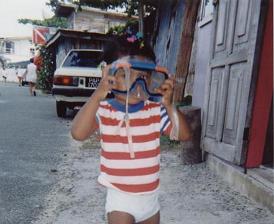
"South America on $320" story # 12
MT. IRVINE'S WONDER
Mt. Irvine, Trinidad & Tobago
July 7, 2002
Mt. Irvine was an emerald-precious beach on Tobago's western Caribbean side. Short, soft, steep sand curved with a profound centrifugal force.
The inviting, vibrant water it sat and watched seemed to promise that if you entered it you'd be swept away by its allure. To the right, beach and moist forest shared an intimate embrace in eternal amor. Slippery, sharp stone created an oceanside walkway below the thirty-foot bluff whose dying effort had been to reach the sea.
Bare-foot, I ouched my way along the broken walkway. Beneath a warm sky, I adorned my mask and flippers and slipped into the rough waters between the crags.
I swam through waves massaging the many rock heads protruding from the sea near the bluff. Diving, I found that I was in twenty feet of water. Each house-like rock reached the floor below, dividing the sea into tall channels and dark tunnels.
On every square inch of rock, everything was beautiful coral. All was green or orange or pink or blue. Sun magically lit up the ancient Athenian underwater halls for as far as the good visibility allowed me to see. Disneyland's colors would've been dull in comparison.
I gave my lungs a work-out, wanting to dive in every direction at once. I wandered about, chasing soft, red squirrelfish under a rock's base, spinning under a stone slab, or waiting to have revealed to me what lay behind a coral-faced wall.
On the water's surface, burly waves collided with the uncovered rock, in places causing foamy whirlpools. Thus, when I plunged my head under, I would momentarily be blind to all but white. Like entering heaven, Mt. Irvine's splendor would soon burst forth.
A transparent fish in pastelles darted between the rocks. A blue and clear fish with a slight beak, round body, and spiky dorsal fin paddled before a sea anemone made only of black needles. Hardened, purple-mouth clams wiggled up from the bottom. A white coral flower grew daintily on the hall's walls.
Every minute, something took my breath away. In one coral crack, I came upon a lucky couple of blue angels. It was hard to believe something so beautiful existed. The garbage can-sized, spade-shaped fish were of the brightest orange. Lacy fins trickled off their bodies, and bright blue areas marked the corners of their faces. Spectacular.
It was a great spot for my last day in Tobago. As I was returning for my sailboat, I walked one of Tobago's dark-paved roads surrounded by un-greedy, bird-filled trees.
I was reminded of the rural town, Ruskin, Florida, where fourteen and seventeen years ago my family had gone to visit my great grandfather, Grandpa Abel's house in retirement. As in Ruskin, you could feel and breath in Tobago how the peaceful land was still unspoiled by the evils of modern civilization. It felt good; free and easy, like a Tobagonian yellow-breasted wren with white eye slashes.
I came upon someone as unspoiled as good old, heron-loving Grandpa Abel, a young "To-baglady-o" named Celine. Celine's grandmother was nice to talk with to.
Celine was two years old, but pranced around in her silver-studded black heels like a model on the catwalk. Her grandmother showed off newspaper photos from the pageants she'd entered, like an Easter Bunny dress contest and Carnival ones. Playful Celine tried on my flippers and my snorkel mask over her thick, black hair. She giggled excitedly when I took her picture.
Celine liked friends. She took me by the hand. I wished I stayed in Tobago so I could teach her to swim. When I left, she clutched my leg and cried.
There's no shame in this, though. I'm twenty years older than Celine, and I was possibly going to clutch Tobago and cry before leaving.

If only everywhere in the world was like Tobago. Hopefully, when I'm good old, blue angel-loving Great Grandpa Breen, I'll be retired in a place like that. It's a shame this story has to end. For now. - Modern Oddyseus